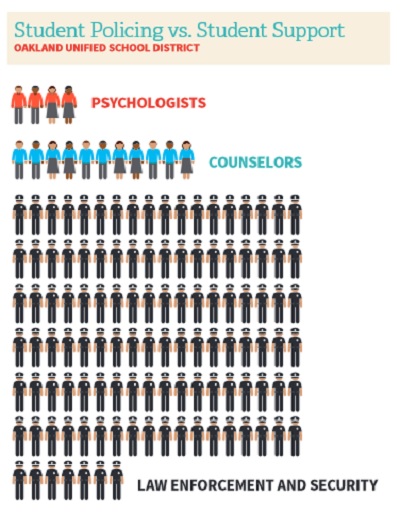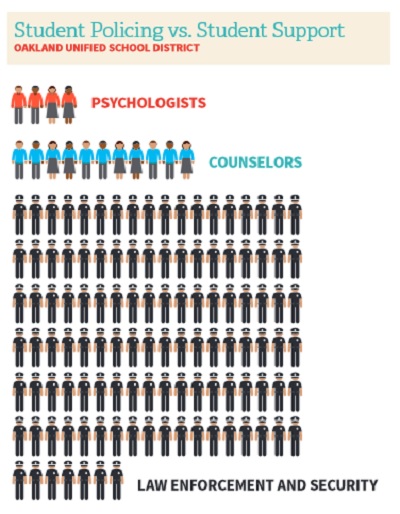Big money from tax increases is supposed to help poor, English learners and foster kids.
A policy brief released this month urges California school districts to reject beefing up campus police forces and security when they start receiving substantial funding aimed at improving education for needy kids.
“The New ‘Separate and Unequal’” brief was prepared by two community groups in Los Angeles and Oakland whose members are concerned that too much police involvement at some schools is negatively affecting primarily Latino and black students.
 From the report titled “The New ‘Separate and Unequal’ “ via The Labor/Community Strategy Center)” width=”400″ height=”514″ />(Image: From the report titled “The New ‘Separate and Unequal’ “ via The Labor/Community Strategy Center)The new education money was raised by a tax increase California voters approved in November 2012. Proposition 30, as the measure was dubbed, is already credited with stabilizing an education system — once nationally admired — that’s been damaged over the years by cuts in funding. Now the state is enacting what’s called the “Local Control Funding Formula,” which will steer extra money to districts with high concentrations of low-income kids, English language learners and foster children.
From the report titled “The New ‘Separate and Unequal’ “ via The Labor/Community Strategy Center)” width=”400″ height=”514″ />(Image: From the report titled “The New ‘Separate and Unequal’ “ via The Labor/Community Strategy Center)The new education money was raised by a tax increase California voters approved in November 2012. Proposition 30, as the measure was dubbed, is already credited with stabilizing an education system — once nationally admired — that’s been damaged over the years by cuts in funding. Now the state is enacting what’s called the “Local Control Funding Formula,” which will steer extra money to districts with high concentrations of low-income kids, English language learners and foster children.
School boards can design their own spending plans for those funds. The new brief calls this infusion of money a “rare opportunity” to invest in academic and support services and remove barriers to black and Latino kids’ success. But it also argues that “over-policing of their schools is undeniably one of [those barriers.]”
One of the groups, the Los Angeles-based Labor-Community Strategy Center, has been instrumental in persuading the L.A. Unified School District to roll back ticketing of students by campus police that was sending thousands of middle-school kids into courts every year for minor infractions.
The brief reports that the Los Angeles Unified School District’s budget for this year calls for spending more than $91 million on policing and security, including nearly $50 million for campus police officers and more than $32 million for civilian campus aides hired to patrol halls.
The report, which includes footnotes to L.A. Unified’s budget, also notes that the district budgeted more in unrestricted funds for security than for after-school programs. The security expenditure, the report also says, is more than the expenditures for counselors, “and far more than double what it budgeted for health services and teacher assistants.”
The other organization that produced the brief is the Black Organizing Project in Oakland, a parents group concerned that poor police relations with black youth are harming children’s future. New data shows that black youth are arrested and then not charged in that city in vastly disproportionate numbers, as the Center has reported.
The brief notes that during the last academic year, California schools, statewide, had one counselor for every 808 students, one of the worst such ratios in the country.
Monica Carazo, a spokeswoman for L.A. Unified, said the district couldn’t comment on the brief because officials were still reviewing it.
As the Los Angeles Times has reported, parents’ groups are mobilizing to demand that 80 percent of a $1 billion infusion that could be headed to L.A. Unified be spent directly at schools with needy kids, and not on the district’s bureaucracy. School board member Monica Garcia, who has supported limiting police involvement in routine discipline, released a statement recently that said the district “must be transparent and accountable for support to low-income, English learners and foster care children.”
Join us in defending the truth before it’s too late
The future of independent journalism is uncertain, and the consequences of losing it are too grave to ignore. To ensure Truthout remains safe, strong, and free, we need to raise $47,000 in the next 8 days. Every dollar raised goes directly toward the costs of producing news you can trust.
Please give what you can — because by supporting us with a tax-deductible donation, you’re not just preserving a source of news, you’re helping to safeguard what’s left of our democracy.
